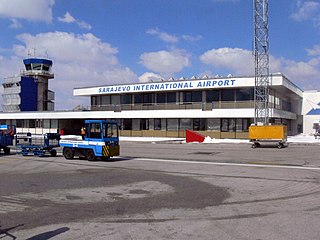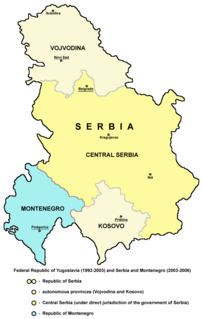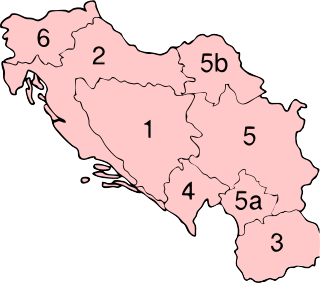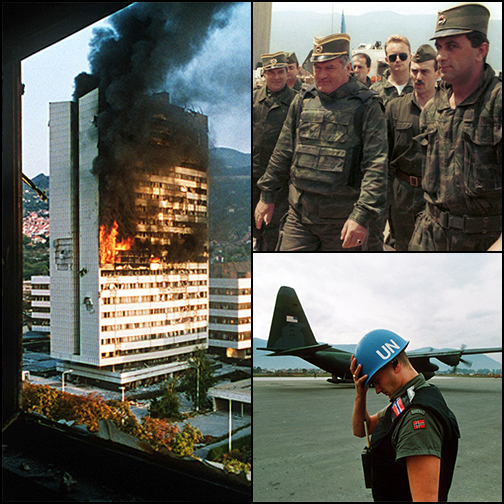United Nations Security Council resolution 743, adopted unanimously on 21 February 1992, after reaffirming resolutions 713 (1991), 721 (1991), 724 (1991), 727 (1992) and 740 (1992), and considering that the situation in the Socialist Federal Republic of Yugoslavia constitutes a threat to international peace and stability, the Council established a peacekeeping mission in the country, known as the United Nations Protection Force (UNPROFOR), with the aim of reaching a peaceful political settlement in the region.
United Nations Security Council resolution 749, adopted unanimously on 7 April 1992, after reaffirming resolutions 713 (1991), 721 (1991), 724 (1991), 727 (1992), 740 (1992) and 743 (1992), the Council approved of a report by the Secretary-General Boutros Boutros-Ghali and decided to authorise the earliest possible deployment of the United Nations Protection Force (UNPROFOR) in the former Yugoslavia.

United Nations Security Council resolution 758, adopted unanimously on 8 June 1992, after reaffirming resolutions 713 (1991), 721 (1991), 724 (1991), 727 (1992), 740 (1992) 743 (1992), 749 (1992), 752 (1992) and 757 (1992), the Council, in accordance with a report by the Secretary-General Boutros Boutros-Ghali, decided to enlarge the mandate and strength of the United Nations Protection Force (UNPROFOR) in former Yugoslavia.

United Nations Security Council resolution 779, adopted unanimously on 6 October 1992, after reaffirming Resolution 743 (1992) and subsequent resolutions and noting a report by the Secretary-General Boutros Boutros-Ghali submitted pursuant to resolutions 743 and 762 (1992), the Council authorised the United Nations Protection Force (UNPROFOR) to assume responsibility for monitoring the complete withdrawal of the Yugoslav People's Army from Croatia, demilitarization of the Prevlaka peninsula and the removal of heavy weapons from neighbouring areas of Croatia and Montenegro in co-operation with the European Community Monitoring Mission.

United Nations Security Council resolution 781, adopted on 9 October 1992, after reaffirming Resolution 713 (1991) and all subsequent resolutions on the situation in the former Yugoslavia, the Council decided to impose a ban on military flights in the airspace over Bosnia and Herzegovina, acting in accordance with the provisions set out in Resolution 770 (1992).

United Nations Security Council resolution 786, adopted unanimously on 10 November 1992, after reaffirming Resolution 781 (1992), the Council approved a recommendation by the Secretary-General Boutros Boutros-Ghali to increase the strength of the United Nations Protection Force (UNPROFOR) in Bosnia and Herzegovina by 75 observers to monitor the ban on military flights over the country.

United Nations Security Council resolution 787, adopted on 16 November 1992, after reaffirming Resolution 713 (1991) and all subsequent resolutions on the topic, the Council called upon the parties in Bosnia and Herzegovina to consider the draft outline constitution as a basis for negotiating a political settlement of the conflict in the country, and went on to impose further international sanctions on the Federal Republic of Yugoslavia.

United Nations Security Council resolution 807, adopted unanimously on 19 February 1993, after reaffirming Resolution 743 (1992) and all subsequent relevant resolutions concerning the United Nations Protection Force (UNPROFOR), the Council determined that the situation in Bosnia and Herzegovina and Croatia continued to constitute a threat to international peace and security and therefore extended the mandate of UNPROFOR for an interim period ending 31 March 1993.

United Nations Security Council resolution 815, adopted unanimously on 30 March 1993, after reaffirming Resolution 743 (1992) and all subsequent relevant resolutions concerning the United Nations Protection Force (UNPROFOR) including 802 (1993) and 807 (1993), the Council, acting under Chapter VII of the United Nations Charter, extended UNPROFOR's mandate for an additional interim period ending 30 June 1993.

United Nations Security Council resolution 820, adopted on 17 April 1993, after reaffirming all previous resolutions on the topic for a lasting peace settlement in Bosnia and Herzegovina and the region, the Council discussed the peace plan for Bosnia and Herzegovina and comprehensive steps to ensure its implementation.

United Nations Security Council resolution 824, adopted unanimously on 6 May 1993, after considering a report by the Secretary-General Boutros Boutros-Ghali pursuant to Resolution 819 (1993), the Council discussed the treatment of certain towns and surroundings as "safe areas" in Bosnia and Herzegovina.

United Nations Security Council resolution 859, adopted unanimously on 24 August 1993, after recalling all resolutions on the situation in Bosnia and Herzegovina, the Council noted that, despite all previous Security Council resolutions since Resolution 713 (1991), the region was still a scene of hostilities and there was little compliance with previous resolutions, particularly by the Bosnian Serb party.

United Nations Security Council resolution 871, adopted unanimously on 4 October 1993, after reaffirming resolutions Resolution 713 (1992) and Resolution 743 (1992) and subsequent resolutions relating to the situation in the former Yugoslavia and United Nations Protection Force (UNPROFOR), the Council expressed concern that United Nations peacekeeping plan for Croatia, in particular Resolution 769 (1992), had not been implemented and went on to discuss the peace plan and extend UNPROFOR's mandate until 31 March 1994.
United Nations Security Council resolution 908, adopted unanimously on 31 March 1994, after reaffirming all resolutions on the situation in the former Yugoslavia and in particular Resolution 871 (1993), the Council extended the mandate of the United Nations Protection Force (UNPROFOR) until 30 September 1994 and declared its intention to increase the number of personnel in the peacekeeping force.

United Nations Security Council resolution 913 was adopted unanimously on 22 April 1994, after reaffirming all resolutions on the situation in Bosnia and Herzegovina and also Resolution 908 (1994). The Council discussed the situation in the safe area of Goražde and a settlement of the conflict.

United Nations Security Council resolution 941, adopted unanimously on 30 September 1994, after recalling all resolutions on the situation on the former Yugoslavia including Resolution 908 (1994), the Council discussed the situation in Croatia and extended the mandate of the United Nations Protection Force (UNPROFOR) until 31 March 1995.

United Nations Security Council resolution 959, adopted unanimously on 19 November 1994, after recalling all resolutions on the situation in Bosnia and Herzegovina including resolutions Resolution 824 (1993) and Resolution 836 (1993), the Council discussed the efforts of the United Nations Protection Force (UNPROFOR) to ensure the implementation of Security Council resolutions in the safe areas of Bosnia and Herzegovina.

United Nations Security Council resolution 998, adopted on 16 June 1995, after reaffirming all resolutions on the conflicts in the former Yugoslavia, in particular Resolution 982 (1994), the Council established a rapid reaction force of up to 12,500 personnel within the United Nations Protection Force (UNPROFOR) in Bosnia and Herzegovina following attacks on it and the overall deteriorating situation.

United Nations Security Council resolution 1004, adopted unanimously on 12 July 1995, after recalling all resolutions on the situation in the former Yugoslavia, the Council, acting under Chapter VII of the United Nations Charter, demanded that Bosnian Serb forces withdraw from the safe area of Srebrenica in Bosnia and Herzegovina and respect the safety of personnel from the United Nations Protection Force (UNPROFOR). The resolution was passed during the Srebrenica massacre.
United Nations Security Council resolution 1019, adopted unanimously on 9 November 1995, after recalling resolutions 1004 (1995) and 1010 (1995) on the situation in Bosnia and Herzegovina and 1009 (1995) concerning Croatia, the Council discussed violations of international humanitarian law in the former Yugoslavia.




















